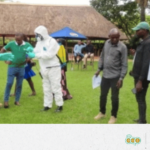Regional responses
- 10/04/2020
- Posted by: Gaetan Dermien
- Category: Uncategorized
The Pan-African Farmers Organization (PAFO) has issued a statement on the commitment and responsibility of African farmers to ensure food security during COVID-19 quarantine. The communication notes that “In addition to the front lines of our ‘white’ soldiers who provide medical and paramedical care to our fellow citizens, our farmers, the ‘green’ soldiers of our Nations are on the front line to avoid food shortages and will ensure food security in this time of crisis.” PAFO notes that agriculture is a priority sector, and the family farmers’ production system and supply of food products is an absolute priority during this period. PAFO will continue to create awareness on control measures and double its efforts in on-farm activities to produce more food, supply the available markets, and feed Africa.
In light of the COVID-19 pandemic, PAFO and COLEACP are joining efforts to protect and strengthen national food production and distribution systems across African countries. In the short run, this means supporting the agricultural sector in protecting the health and safety of employees, workers, producers and their communities; safeguarding livelihoods as well as food security and nutrition. The initial focus is on disseminating information and training tools adapted and relevant to the preventive health and safety measures to implement at community, farm and company level. In parallel, specific business support to farmers’ organisations and MSMEs will address and mitigate the negative socio-economic impacts of COVID-19. Finally, a thorough impact study will inform the design of holistic recovery plans for the agricultural sector.
Agridigitale (3 April) reports that the ECOWAS Directorate of Agriculture and Rural Development has alerted decision-makers on urgent measures to avoid a food crisis. The Directorate suggests that a food security system is needed, and lists six emergency measures.
- Encourage producers to continue producing short-cycle products (plants and animals) to supply confined cities, equip them with protective equipment to support their mobility, and subsidise them.
- To avoid over-reliance on imported products and supermarkets, and to support local suppliers, maintain, organise, discipline and monitor local markets for vegetables and foodstuffs, including organisation of collective supermarkets and the necessary sanitary measures.
- Maintain, facilitate and supervise cross-border trade in foodstuffs. It is important not to close the borders to traders and workers, instead providing protective equipment, testing and treatment at the borders.
- Order enriched flour with high nutritional and energy potential from local processors and ensure distribution to the most vulnerable.
- Maintain surveillance and vigilance on pests and diseases of plants and animals, especially transboundary pests, which include armyworm, among others.
- Improve the use of media, especially television, to educate people on the best way to eat, to produce vegetables at home, etc.

![EU and GB approval changes (August-November 2024) 9-FFM+-[ENG]](https://news.colead.link/wp-content/uploads/2024/06/9-FFM-ENG-150x150.jpg)



